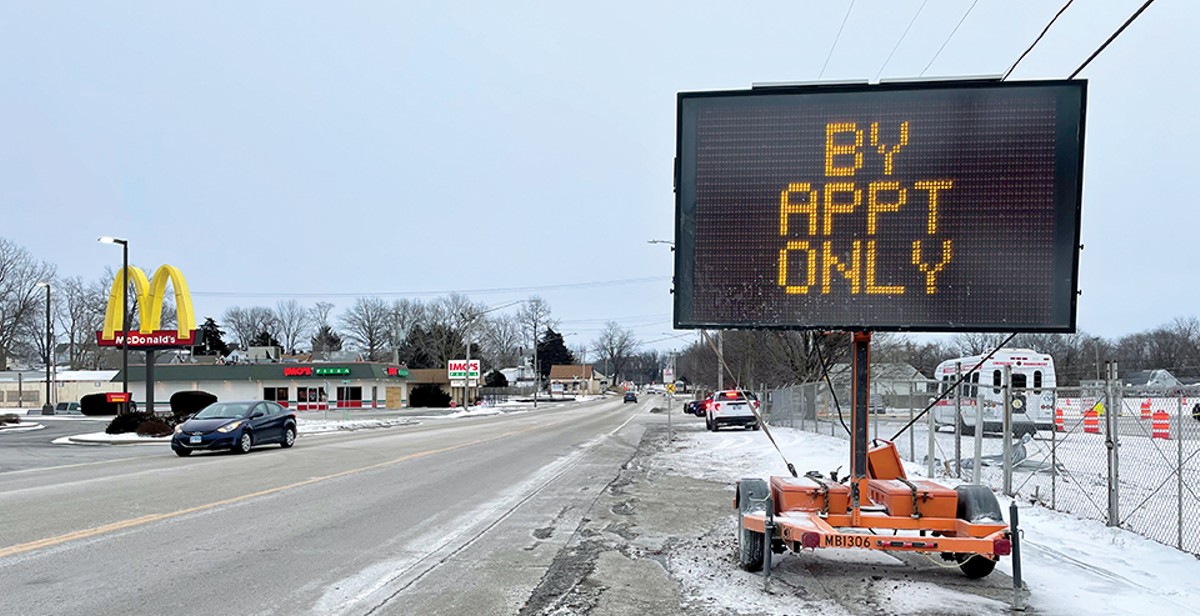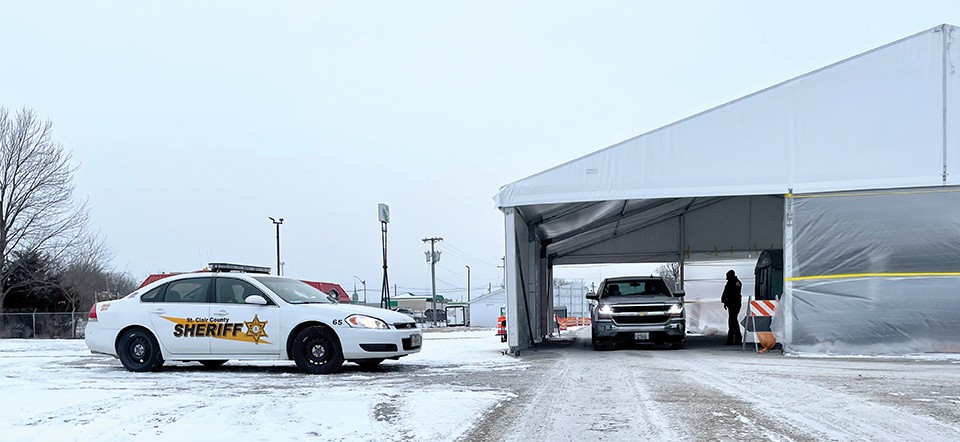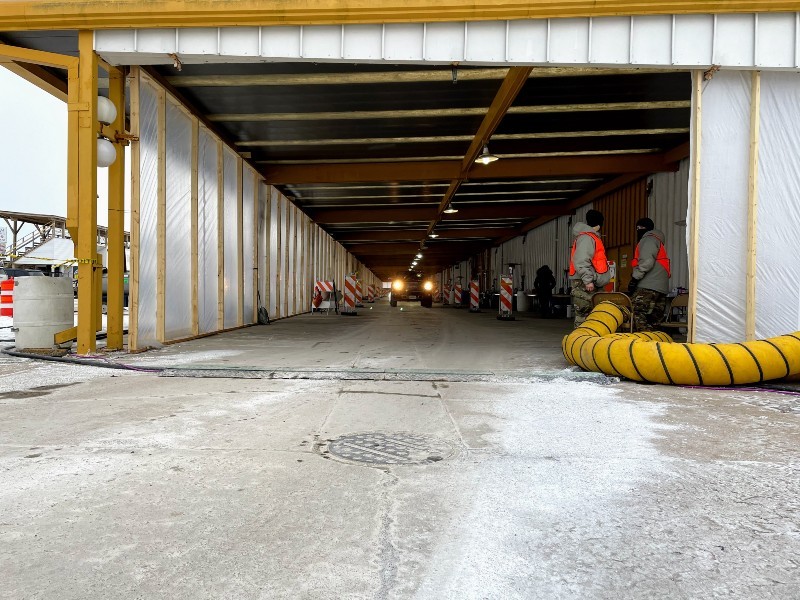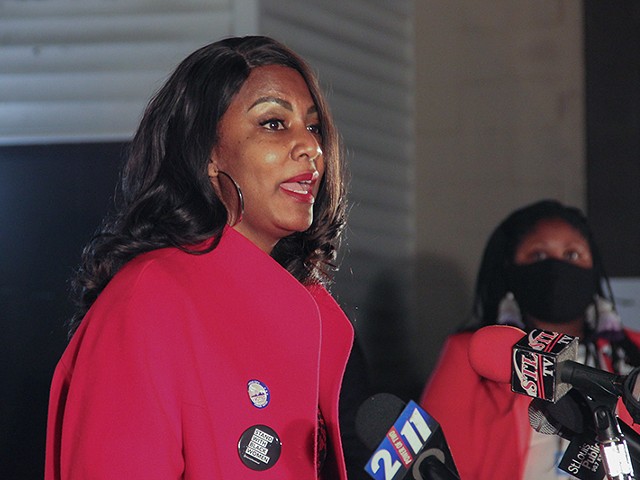In late January, data released by the Centers for Disease Control and Prevention revealed that Missouri was ranked dead-last among all states in terms of vaccination rates, prompting residents to get creative to secure their shots. Those in the major metropolitan areas, especially, have begun traveling to rural communities that are flush with vaccines, while some of those same communities have opened up eligibility to ensure their shots don't go to waste. For this week's cover story, two RFT writers tried their hands at getting vaccinated and reported back. For the other story in this package, click here.
I first heard of the elusive "vaccinated 23-year-old" scenario a month ago.
In the tales passed along through word of mouth, text messages and hastily coded websites, people at the back end of the system of vaccine-eligibility tiers had leaped months ahead of schedule simply by calling around to hospitals and mass vaccination events to find unused doses that would otherwise land in the trash can. I had heard second-hand that some hospitals were having to throw away vaccines. It seemed plausible enough. Vials contained multiple doses, which were highly perishable. That meant all doses had to be used within a couple hours of a vial being opened. As the stories went, hospitals sometimes couldn't find enough eligible people for all the activated shots and would inject them into the arms of anyone who could drop in before the vaccine expired.
I decided I would call a few hospitals. If I ended up with a vaccine, great. If not, no big deal.
I dialed St. John's Mercy Medical Center.
"Hi. I heard that if there are leftover vaccines, you throw them out. If that's true, could I get one?"
There was a pause on the other end. "Um, this is the front desk. I'll transfer you."
Click — the phone rang. I crossed my legs and tapped a finger. There was a beep, then the line dropped. I frowned, then called Barnes-Jewish Hospital.
"Hi, my name is Jack, and I heard that you guys throw out vaccines at the end of the day?"
"No, we don't do that."
I tried to think of a reply. "Um ...." A few seconds passed.
"Have a nice day." The woman hung up.
I sat there for a while, looking at the model kits my dad keeps near the ceiling — the Incredible Hulk wrestling with a dinosaur, Superman punching his way through a brick wall. Maybe calling wasn't the best method.
The next day, I drove to Barnes. I suppose there are other hospitals I could've gone to (and I have a feeling rural hospitals are more likely to give you a leftover vaccine), but I'm more familiar with BJC, and I like the Central West End.
Having parked, I loitered near an Applebee's, then Euclid Avenue, and perused the hospital signs. Where would Barnes keep its vaccines? Siteman Cancer Center? That seemed wrong. That was the building for advanced medicine. Were vaccines advanced medicine?
The parceling out of vaccines has been a confusing, haphazard operation across the country. No one seems to know where to go or what to do. In the vacuum of clear procedures, private citizens have started cobbling together shot-tracking Facebook groups and hastily coded websites to point people toward temporary bounties. Missouri's rollout has been particularly clumsy, oversupplying rural areas and undersupplying St. Louis and Kansas City. Every day brings more accounts of urbanites with the ability and resources scurrying across the state in search of doses.
In the background are questions of the morality of the system as debates rage about who gets vaccinated and when. Missouri Governor Mike Parson infuriated educators when he initially refused to prioritize teachers, even as he pushed to open schools. He has also admitted there are "vaccine deserts" in parts of the cities — an inequality that has hit primarily Black and brown neighborhoods especially hard.
It's clear that the state has done a poor job getting shots to those who need them most. But what is the morality of letting shots go to waste? I'm young and healthy, and that understandably places me at the lowest priority in the state's tiered system. Am I jumping the line if excess shots are available and would otherwise go to waste? Maybe it's as simple as what I'd heard in all those accounts of vaccinated twenty-somethings: It was better than extra doses landing in the trash can.
At Barnes, I walked through the doorway into a big lobby. The ceilings were high above clean hardwood floors. People lounged in leather chairs. Poles with retractable straps (the kind school cafeterias use) created a single lane leading from the entrance to a plastic foldout table. Behind the table sat two women, nearly identical, who wore face guards over their masks. In order to enter the building, you had to first approach the women.
I walked up. One of them peered down at a piece of paper and said, "Have you had any symptoms of COVID-19? Have you been in contact with anyone who has tested positive in the past fourteen days? Have you experienced any symptoms of COVID-19, including loss of taste, smell ...." After she finished, I said, "No." She peeled a sticker off a roll and handed it to me. There was a "2" written on it. The other stickers had 2s too.
"Actually, I had a question about vaccines," I said as I placed the sticker on my jeans. "Is this where you give vaccines?"
"Oh." She pointed to her left. "Talk to him."
A man sat behind a desk. He was thin, wearing a gray suit and bent over paperwork.
"Hi. I have some questions about vaccines."
"We have a website for that." He opened a laptop. "I can give you the link."
Internally, I sighed. I knew the website he was talking about, and it wouldn't help.
"Actually, I'm a reporter."
"You are? I used to be a reporter. Jeffrey Small for Channel 5." He squinted. "You know, you should be going through media relations."
Media relations. I already knew that was a dead end. Phone calls with people in tinny voices.
"Oh. Technically, I'm an intern. This is my second week."
"I see. You like it?"
"Yeah."
"That's good. I'll give you their number." He tore a sheet of paper off a notepad, then paused. "Who are you with again?"
"The Riverfront Times."
He nodded, then began writing.
We talked a little more before he handed me a note and I walked out of the hospital.
A few days passed, and Small's note remained untouched on my desk. This didn't matter, because I got a text from my sister:
"Just an FYI if anyone is interested....The Belleville Fairgrounds are doing a drive thru covid vaccine event tomorrow-this weekend and need people to sign up so the vaccines don't go to waste."
Her text included a long, random-looking website and an eight-character registration code.
"It says it was for people over 75 and healthcare workers only, but they didn't have enough people under this category registered and they've opened it to the public."
My sister added, "A friend sent this!"
I followed the link and began filling in information. No way this works, I thought. I hit submit. "Registration complete," the page said. My appointment was in two days. I jumped around the house, still holding my phone. It seemed I'd found my scenario.
If the past year has taught me anything, it's to always leave room for disappointment. I graduated college without a proper goodbye. I spent my summer at home rather than a summer camp (I had plans to be a counselor). A lot of friends lost their post-graduation jobs, and most of them live with their parents, as do I.
This vaccine proved to be no different. The day before my appointment, I got a call from the St. Clair County health clinic. I wasn't eligible, I shouldn't have gotten the link, and if I showed up I'd be turned away. I was disappointed, but not sorrowfully so.
That night, I met some friends at a county rec center to play basketball. (As Washington University students, these friends get saliva tested weekly, and I hardly leave the house, so we figured the risk of catching or spreading the virus was low.) It was 8 p.m. and cold. Ours were the only cars in the parking lot. As we shuffled one by one past the front desk, a woman measured the temperatures on our wrists. She nodded silently until each of us was through. It felt like we were entering a speak-easy.
Later, A— and I sat courtside watching the game. Our heads followed the ball as it traveled from one hoop to the other. Shoes squeaked like many birds whistling.
"I feel less bad about doing this now that people are getting vaccinated," A— said.
"People are getting vaccinated?" I said.
"J— did the other week. R— has been for at least a month."
"How?"
"It's a little sketch. J—'s mom hooked him up. I don't know how. R— was volunteering at a vaccine drive, though, and at the end of the day they had extras."
I sighed.
On Sunday, February 14, despite not having an appointment, I decided to drive to the Belle-Clair Fairgrounds & Expo Center in Belleville, Illinois. I would ask a few questions for my story, see what a vaccine drive looked like and ask if they had extras. There was a snowstorm forecasted to begin in a few hours, so I threw a shovel in the trunk. It was 9 degrees. On the way, I passed a burning car. Black smoke curled into the sky.
The Belle-Clair Fairgrounds & Expo Center is a huge parking lot surrounded by a fence. Above the top rail runs three rows of barbed wire. Across the street is a McDonald's. That day, there was a layer of old snow over everything. Guarding the entrance were two police cars and a sign that said, "COVID 19 VACCINE SITE / BY APPT ONLY."
When I turned inside the lot, a man in a beige jumpsuit stepped forward and began pointing at my car, then a lane made of cones and caution tape. I rolled down my window and said I was a reporter and I had some questions.
"A reporter?"
I confirmed. He mumbled into a walkie talkie on his shoulder. Then he lifted the caution tape for my car to crawl under. I parked on the snow and got out to take pictures.
"Who are you with again?" he yelled from a distance.
"The Riverfront Times!"
"Riverfront Time," he murmured into his shoulder.
A little while later, a white Ford Escape approached. I got back in my car. The Ford stopped with its driver-side door across from mine. The window rolled down, and a man looked out.
He introduced himself as Herb Simmons, the St. Clair County Emergency Management Agency director. He had thin white hair and rectangular glasses. In the passenger seat was another man, maskless, who tapped at his phone.
I told Simmons I was there about the ineligible registrations, and he eased into a speech. I grabbed my phone, hit record and held it out the window, but soon I realized I wasn't wearing gloves. I devised a system: When one hand held the phone, the other warmed against my breath. Simmons told me how well things were going. I switched hands. There were hiccups with all the ineligible people showing up on Friday, but now that was over. They'd had to turn away a lot of people — how many they weren't sure. A breeze picked up. I eyed the gloves, which lay mockingly in the seat next to me, and calculated how I could put them on without dropping the phone. Would it balance on the door?
See Also: Shot Chasers: Confessions of a Vaccine 'Cheater'Simmons and I continued like this, a follow-up question here and there, until it seemed he had said all he wanted to.
"One last thing," I said. "Have you had to throw away any vaccines?"
"No. No vaccines have gone to waste."
Trying not to seem disappointed, I nodded. I set the phone aside, rubbed my hands, then sat on them. Simmons offered to show me around the place, and I said sure, why not?
For the next half hour, Simmons was Virgil and I was Dante. I saw the entrails of a mass vaccination site. My favorite part was a big metal shed with three sections labeled "Cows," "Swine" and "Sheep." This had nothing to do with the vaccination process; I just enjoyed the commitment to labeling.
After I waved goodbye to Simmons and his friend, I rolled up my window and turned the heat as high as it went. Despite the setbacks, I was confident I would find my vaccine scenario someday. I left the fairgrounds hoping to be home before the storm arrived.
On a recent Tuesday, the first warm day in months, I went to the park to play basketball. I didn't stay long, though. The courts were all taken. I had gotten there early, as did one other friend, so we texted the group. The others quickly made plans for Three Kings happy hour or Forest Park.
As I got up to leave, I noticed the friend was putting on his shoes.
"You staying?"
"Yeah, I think I'll play with those guys. They're grad students, and I've played with them before."
"You're not worried about the virus?"
"No," he said. "Got vaccinated last week."
"How?"
"I work at a hospital, and they had extras."
"Do they ever have extras still?"
"Sometimes, but they only give them to employees." He stood.
"Well, if they're ever about to throw any out ...."
"Yeah, I'll let you know." Then he jogged off towards the court.
Read the other story in our "Shot Chasers" package.








